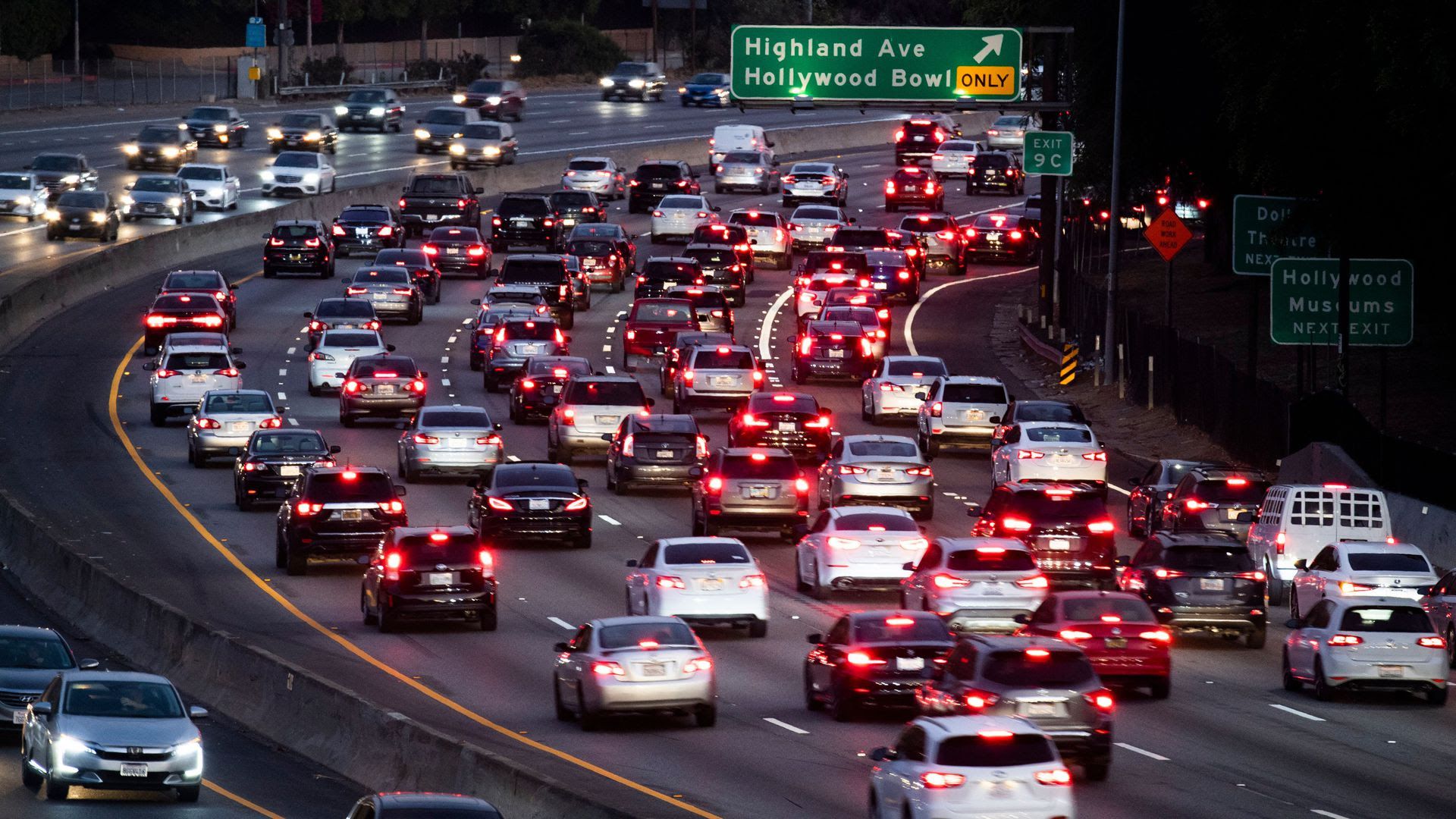Trump's war with California leaves automakers with nowhere to hide
Add Axios as your preferred source to
see more of our stories on Google.

101 freeway in Los Angeles in September 2019. Photo: Robyn Beck/AFP/Getty Images
President Trump's war with California over carbon emissions is putting several giant automakers in activists' crosshairs.
Driving the news: Multiple shareholder and environmental groups have begun, or are weighing, pressure campaigns against companies that have sided with the White House effort to strip California's power to impose strict mandates.
- GM, Toyota, Fiat Chrysler and several others intervened earlier this week on the administration's side in litigation on the matter.
Why it matters: It's the latest sign of how automakers are in a politically volatile, awkward position that risks attacks from either the Twitter-happy president — who isn't shy about attacking specific companies — or activist groups.
- Senior White House officials pressed GM and others to side with the administration, per reports in the Washington Post and the New York Times.
One big question: Whether the campaigns could create a consumer backlash against automakers siding with the White House.
- Already, the NYT reports that Toyota's move in the litigation "shocked consumers" in eco-conscious California.
Where it stands: The sustainable investment advocacy group Ceres tells me they're working with allies to consider the "full suite of levers investors can pull as shareholders and as public officials and thought leaders."
- "These include but aren't limited to direct shareholder engagement and shareholder resolutions. Investors also have the option of using their public platforms to condemn these decisions (public letters, op-eds, social media, etc.)," Ceres spokesperson Troy Shaheen said.
- Other groups including the Sierra Club and the investor advocacy group As You Sow have also been critical of GM and other automakers on the matter.
The big picture: A truce of sorts is collapsing. While environmental pressure on the auto industry is decades-old, recent years have been relatively calm compared to pressure against the oil industry over climate change.
- That's because the industry reached an agreement with the Obama administration during his first term on national emissions and mileage standards that were supposed to run until 2025.
- But that all began to change when the industry supported Trump administration efforts to revisit the rules that manufacturers said were proving unrealistic.
- Automakers have now splintered over whether to back Trump's plan to greatly weaken the rules beyond what the companies believe is appropriate.
- Reports last night confirm that the administration is backing off plans to freeze vehicle emissions and mileage rules and will instead require modest increases. The reporting adds clarity to where the administration will land when it comes to the hotly disputed rules.
- The upcoming final rules will likely require 1.5% annual fuel economy gains through 2025, according to the Wall Street Journal.
The intrigue: The reported 1.5% boost is far less aggressive than Obama-era mileage and emissions mandates for cars and light trucks that the Trump administration is abandoning.
- It's also softer than the deal Ford, VW, Honda and BMW struck with California in July. That agreement calls for emissions standards — essentially a proxy for mileage — that grow 3.7% stronger annually through 2026.
What's next: The administration's move, expected for weeks, is unlikely to end the intense political and legal battles over the topic.
- A California Air Resources Board spokesperson tells the Sacramento Bee that 1.5% increases are "not nearly enough."
The bottom line: Consumer Reports circulated a short analysis last night that concludes...
- A 1.5% increase would bring a fleetwide average of 31.8 miles per gallon under real-world conditions in model year 2026, compared to 37.5 mpg under the Obama rules.
- Added annual fuel costs for those 2026 vehicles would be $3,200 per year.
- They caution that their analysis does not include potential "loopholes" in the regulation.
Go deeper: Trump officials likely to back off automotive regulations freeze
